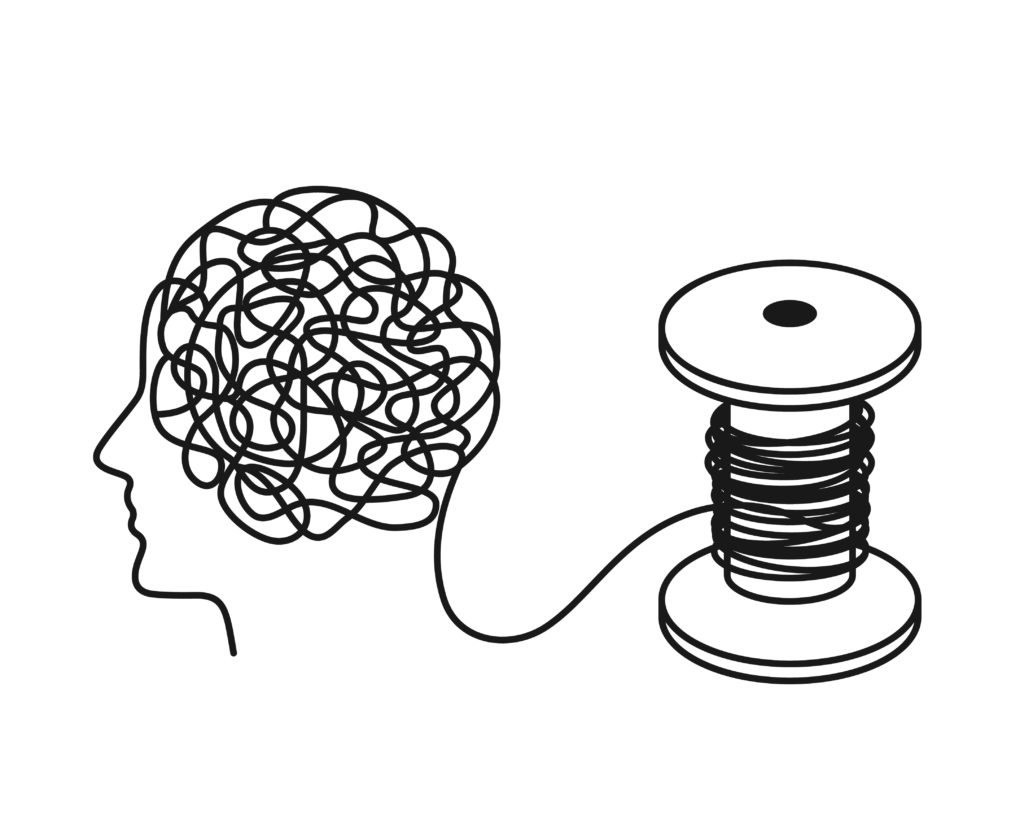Today’s topic is how to achieve the VERY thing so many of us strive for — the thing that seems to be our number one goal because we put in so much effort trying to accomplish it.
So without any further ado, I will now teach you how to feel totally miserable and stressed out all the time!
I know, it sounds pretty challenging to achieve, but really, it isn’t that hard.
Luckily for you, scientific research proves that all of your feelings are created by thoughts in your head. So if you practice discouraging thinking, you will feel discouraged, and I can show you how to do it.

Stress can appear easily and quickly. Training your mind to think a certain way and not changing habits can certainly increase your stress.
The Proof is in the Puddin’
“But wait a minute,” you might be thinking. “I thought my life situation determined how I felt. Like, if my boss is a jerk then I’m angry, and if I’m eating ice cream then I feel happy. Right?
“Certainly, there is no way that it is my own thoughts that create excitement, joy, peace, anger, frustration, and anxiety! Otherwise, I would always feel exactly what I wanted!”
I hear you, but according to researchers who study Cognitive Behavioral Therapy, or CBT, thinking patterns cause stress in patients, not circumstances. The American Psychological Association says that patients are taught to “recognize one’s distortions in thinking that are creating problems, and then to reevaluate them in light of reality.”
In other words, your thoughts create your problems, and learning how to think more clearly solves more problems than changing life circumstances. This is great news, because now you can finally achieve your life-long goal of feeling horrible at work, at home, and in your relationships!
Feeling horrible on a daily basis is quite simple to achieve. Negative thinking, lack of sleep, and allowing your inner voice to consume you will allow you to feel miserable and overly stressed.
Bringin’ Home the Bacon
Most adults spend more time working than they do sleeping, so let’s start there in our attempts to be miserable.
You know that voice in your head? The one that tries to convince you that you are an imposter at everything you do? Listen to that voice. It will remind you that mistakes are not an option, and if you do make a mistake, you should never let anyone know.
To be miserable all the time, you have to put on a face that shows you always know what you are doing. Everyone else is in direct competition with you and your success. Watch what they are doing. When they succeed, remind yourself that it is because they are better than you and you will never measure up.
Always do more.
Your anxiety grows with your to-do list. And as you experience more stress, one of the most powerful things you can do to ensure that you stay stressed is to try and avoid the feeling altogether. The more you fight the stress, the more intense it becomes.
You can ignore overwhelming feelings by binging shows, over-drinking, or scrolling on social media. This is called emotional avoidance (or buffering) and, ironically, it impacts your emotions.
Lastly, once you’ve added all you can think of to your own workload, keep adding the stuff everyone else wants you to do — especially your boss. It doesn’t matter if it is unpaid overtime, on the weekend, or during your vacation time — always say yes.
And ALWAYS bring your work stress home with you. This will make your home life as miserable as life at work.

Bringing your stress home does not allow for a comfortable environment. It allows stress to consume the one place you hope for peace and relaxation.
Home Sweet Home
We think of home as a relaxing place, a respite from the stresses of work. But it doesn’t have to be that way. Just ask any stay-at-home parent!
Whether you work away from home, or spend your time working at home, I have the perfect trick for you to keep your anxiety high. Try imagining a person following you around with a clip-board whenever you are home. This person’s job is to keep a list and ensure that you are measuring up to an imaginary standard you have in your head.
Did you exercise today?
Why are you yelling at your kids?
Are you keeping up with the neighbors?
This imaginary person only cares about your personal misery. Make sure to keep them around at all times.
Are you exhausted yet? Good! It’s working! Now add more to the list and keep going.
This “scorekeeper” notices how much screen time the kids have each day and what you eat when no one else is around. You’ll know it’s working if you feel like you are losing.
Any time you start to feel content with your home life, bring your attention back to the clipboard person. They will remind you of all your failures and you will immediately get back to feeling the shame and discouragement you work so hard for!
Another way to destroy a peaceful home life is to use the magic word “should” as often as possible.
Should is an exciting word!
In almost every circumstance, should creates a battle in your mind about what is happening in your life and what you wish were happening; what you should be doing, and what you are actually doing; and what others do to you and what you think they should be doing.
Byron Katie famously said, “When I argue with reality, I lose—but only 100 percent of the time.”
That’s right! Pick as many fights with reality as you can, and see your suffering continue to grow—100 percent of the time!
Negative thinking around how to handle certain life circumstances will make you feel extremely worried and impact your physical and mental health.
Those You Love (To Bicker With) The Most
Speaking of your partner, they definitely need someone to “should” all over them. They shouldn’t squeeze the toothpaste tube the way they do. They also should fold your socks the right way whenever they do laundry. Shouldn’t they know by now?!
This is the perfect opportunity for you to jump to conclusions and start telling yourself a really hurtful story. Tell yourself they don’t respect your ideas. Tell yourself they don’t listen to you. You could even tell yourself they don’t love you anymore.
Even though you have read the research and know that you are the one who creates your feelings, just keep blaming everyone, everything, and every circumstance for your feelings. The sense of disempowerment is .. . *chef’s kiss*.
These stories that you tell yourself are crucial for miserable people. The more they are based on conjecture and distorted thinking, the better. Never question the story going through your mind. It is there for a reason and a miserable person knows that it is always the truth.
Questioning your thoughts and creating more joyful thoughts is the whole purpose of Byron Katie’s “The Work.” Since joy is the opposite of our goal, it makes sense to trust your thoughts implicitly.
I repeat: Never question your thoughts.
The voice in your head tells you that you are unworthy of love from your partner, and that if you can just figure out what they like, then you can manipulate them into loving you again. (Oh yes, we all just love a good manipulation game.)
The voice also tells you that your happiness is based on what your partner does or doesn’t do. Not only that, but your happiness depends on the government, the weather, and all the other things you can’t control. The more you try to control these things, the more frustrated, stressed, and miserable you will feel.

If you want to continue to feel overwhelmed in your life, question your thoughts. This will, in fact, affect your relationships and happiness.
I’m Hooked on a (Horrible) Feelin’!
Finally, here are two other general tips if you want to take your misery to the next level:
The first is to spend ample time on social media. Pay attention to what everyone looks like, how great their careers appear to be, and how happy they are.
But don’t let them trick you! They are working as hard as you to feel miserable. It is like this amazing game of who can look the happiest, but feel the worst.
The last tip is to recognize that your mind is like a Google search bar. It is an amazing computer, and it always looks for answers to the questions you ask. Use this to your advantage by asking questions that are full of cognitive distortions.
Cognitive distortions are like foggy glasses which make it hard for you to see reality clearly (if you’ve ever worn a mask and glasses, you know what I mean), for example:
Google, how come I’m such a screw-up?
Why does my hair always look so bad?
How come my boss hates me?
Beware of questions like, how can I learn from my mistakes? Questions like this lead to growth and excitement, instead of frustration.
Whichever question you ask, your brain will go crazy searching for the answer. Fill the search bar with negativity and that is what you will find every time. #lifehack
In addition, this study shows that negative thinking not only harms you emotionally, but can lead to physical repercussions as well.
Now that you have mastered the art of misery at work, at home, and in your relationships, you can successfully create more anger, fear, and worry in all aspects of your life.
It can take practice to master your thoughts to ensure you experience more of the feelings you desire. Your mind always offers a thought to believe, and so you might have to practice with some journaling or other mindfulness techniques so you can get it just right.
With each distorted thought you practice, you will inch closer to eliminating those pesky emotions like peace, joy, and satisfaction and on your way to living the sad, sorry life you’ve always imagined for yourself!
Sources
Hartney, E. & Gan, S. (2021). 10 Cognitive Distortions Identified in CBT. VeryWellMind. https://www.verywellmind.com/ten-cognitive-distortions-identified-in-cbt-22412
APA Div. 12 (Society of Clinical Psychology). (2017). What is Cognitive Behavioral Therapy? Posttraumatic Stress Disorder. https://www.apa.org/ptsd-guideline/patients-and-families/cognitive-behavioral#:~:text=Cognitive%20behavioral%20therapy%20(CBT)%20is,disorders%2C%20and%20severe%20mental%20illness
Araujo, L. (2021). Sleep and Cognition: Yes, Less Than 8 Hours Affects Us, and It’s Scary. The MAPS Institute. https://themapsinstitute.com/sleep-and-cognitive-function/
Dunn, E. (2022). Wanna Feel Good? Start by Getting Good at Feeling Bad. The MAPS Institute. https://themapsinstitute.com/why-we-hide-from-feelings-and-what-to-do-instead/?utm_medium=contributor&utm_source=evan.dunn
The Work of Byron Katie. https://thework.com/
Stabler, C. M. (2021). The Effects of Social Media on Mental Health. Penn Medicine Lancaster General Health. https://lancastergeneralhealth.org/health-hub-home/2021/september/the-effects-of-social-media-on-mental-health
Marchant, N. L., Lovland, L. R., Jones, R.; Binette, A. P., Gonneaud, J., Urquijo, E. M. A., Chételat, G., Villeneuve, S. (2020). Repetitive negative thinking is associated with amyloid, tau, and cognitive decline. Alzheimer’s Association. https://alz-journals.onlinelibrary.wiley.com/doi/full/10.1002/alz.12116
Dunn, E. (2021). Mindfulness: The Word In Everyone’s Mouth Is The Key To Up-Leveling Your Work, Relationships, and Life. The MAPS Institute. https://themapsinstitute.com/mindfulness-the-word-in-everyones-mouth-is-the-key-to-up-leveling-your-work-relationships-and-life/?utm_campaign=Mindfulness%3A-The-Word-In-Everyone%E2%80%99s-Mouth-Is-The-Key-To-Up-Leveling-Your-Work%2C-Relationships%2C-and-Life&utm_medium=contributor&utm_source=evan-dunn
